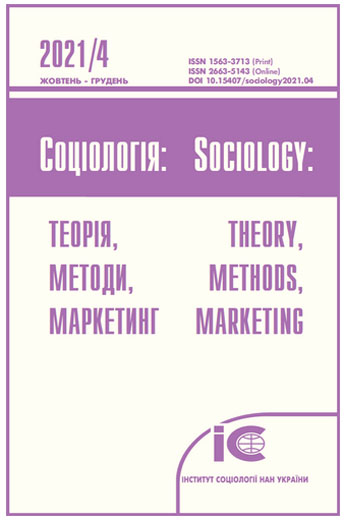Institute of Sociology of the National Academy of Sciences of Ukraine
Institute of Sociology of the National Academy of Sciences of Ukraine (Інститут соціології Національної академії наук України; Instytut sotsiolohii Natsionalnoi akademii nauk Ukrainy). A scientific research institute at the National Academy of Sciences of Ukraine devoted to the study of sociology and its various subfields. It was established in 1990 in Kyiv on the basis of the Department of Sociology of the Institute of Philosophy of the Academy of Sciences of Ukraine (now Institute of Philosophy of the National Academy of Sciences of Ukraine). The department was initially established in 1968 as the Department of Methodology and Techniques of Sociological Research by Pavlo Kopnin, then director of the Institute of Philosophy. For a number of years this department was headed by Myroslav Popovych. In 1983 it was transformed into the Department of Sociology that also included the Subdepartment of the Sociology of Mass Media and Public Opinion, the Sector of the Social and Psychological Problems of Public Opinion, and the Sector of the Sociology of Youth. A number of prominent sociologists and social scientists worked in the department and, subsequently, in the institute, including Volodymyr Paniotto, Lidiia Sokhan, Yevhen Holovakha, Iryna Bekeshkina, and Viktor Nebozhenko. Today the institute is part of the Section of History, Philosophy, and Law of the National Academy of Sciences of Ukraine.
From the time of its inception the institute became the main center for the study of a Ukrainian society in transition. It systematically conducted national and regional opinion polls, including 11 national polls in 1994–2004, at the height of social transformation in Ukraine. One of the most notable of its publication series was the fundamental research study of social and psychological consequences of the Chornobyl nuclear disaster of 1986. Another notable achievement was the publication of a series titled Pravliacha elita suchasnoї Ukraїny (The Ruling Elite of Present-Day Ukraine, 1998). Among the institute’s innovations was also the creation of methodology and procedures for social expertise of various national and regional programs, as well as for measuring and forecasting public opinion. The institute was instrumental in facilitating public interest in the history of Ukrainian sociological thought and social ideas of major Ukrainian intellectuals by republishing the works of Mykhailo Drahomanov, Mykhailo Hrushevsky, Bohdan Kistiakovsky, Viacheslav Lypynsky, and others. The institute has also collected a comprehensive bank of sociological data and has maintained a sizable network of trained interviewers capable of conducting wide-ranging national surveys among representatives of all social groups in Ukraine.
As of 2024 the institute has 8 departments: 1) history and theory of sociology; 2) methodology and methods of sociology; 3) social structures; 4) economic sociology; 5) social expertise; 6) social psychology; 7) sociology of culture and mass communications; and 8) social and political processes. The institute identifies several areas of priority research, which include the specifics of a social-status stratification; trends and mechanisms of social differentiation; trends in the transformation of social structure; dynamics of mass consciousness; social conditions of market economy; factors of adaptation of individuals to the conditions of social crisis; sociology of culture and mass communications; and sociology of politics. In addition, the institute’s scholars work on long-term projects, such as the study of social consequences of the Chornobyl nuclear disaster and post-Chornobyl social policy; monitoring of public opinion; the study of social and political attitudes of different social groups, as well as social and psychological factors contributing to the stabilization and consolidation of the Ukrainian society. The institute hosts the Sociological Association of Ukraine and has a graduate study program. It also operates the Higher School of Sociology (since 2000) that provides advance training courses, including those in SPSS Statistics for professional sociologists.
Over the years, scholars associated with the institute have published a number of important works in different subfields of sociology, including economic sociology (M. Mishchenko and I. Burov, Sotsial'ni aspekty pryvatyzatsiinykh protsesiv v Ukraїni [The Social Aspects of the Processes of Privatization in Ukraine], 1998; A. Arseenko et al., Vyzovy globalizatsii i Ukraїna [The Challenges of Globalization and Ukraine], 2011; V. Vorona, Sotsiolohichni narysy politekonoma [Sociological Notes of a Political Economist], 2000); history and theory of sociology (A. Ruchka and V. Tancher, Kurs istoriї teoretychnoї sotsiolohiї [A Survey of History of Theoretical Sociology], 1995; V. Vorona, ed., Teoretyky svitovoї sotsiolohiї: zhyttia ta tvorchyi spadok [Theoreticians of World Sociology: Lives and Legacies], 2015; V. Pylypenko et al., Modernizatsiia: teoriia, praktyka, tsyvilizatsiinyi vymir [Modernization: Theory, Practice, and Civilizational Dimension], 2016); a history of Ukrainian sociology (M. Zakharchenko et al., Sotsiolohichna dumka Ukraїny: navchal'nyi posibnyk [Sociological Thought in Ukraine: A Manual], 1996; V. Pylypenko, Ukraїns'ka sotsiolohiia siohodni: doslidzhennia osnovnykh sfer zhyttiediial'nosti suspil'stva [Ukrainian Sociology Today: A Study of Major Areas of Social Life], 2012); sociology of everyday life and social perceptions (O. Symonchuk, Sotsial'ni klasy v suchasnykh suspil'stvakh: evrystychnyi potentsial klasovoho analizu [Social Classes in Contemporary Societies: Heuristic Potential of Class Analysis], 2018; Dynamika spryiniattia sotsial'noї nerivnosti v Ukraїni [Dynamics of Perception of Social Inequality in Ukraine], 2020); sociology of politics and civil society (O. Vyshniak, Elektoral'na sotsiolohiia: istoriia, teoriia, metody [Electoral Sociology: History, Theory, Methods], 2000; O. Reznik, ed., Sotsiolohichni vymiry hromadians'koho suspil'stva v Ukraїni [Sociological Dimensions of Civil Society in Ukraine], 2019); and sociology of culture and mass communications (Media. Demokratiia. Kul'tura [Media, Democracy, and Culture], 2008; Yevhen Holovakha et al., eds., Obshchestvo bez doveriia [Society without Trust], 2014; N. Kostenko, ed., Minlyvosti kul'tury: sotsiolohichni proektsiї [The Shifting Culture: Sociological Projections], 2015).
The institute’s main periodical is the quarterly Sotsiolohiia: Teoriia, Metody, Marketynh / Sociology: Theory, Methods, Marketing (since 1998). Other periodicals include Ukraїns'ke suspil'stvo: monitorynh sotsial'nykh zmin (22 vols, since 2014), Sotsial'ni vymiry suspil'stva (22 vols, 1998–2019), and bibliographic yearbook Bibliohrafichnyi shchorichnyk publikatsii (26 vols, 1998–2023). The institute’s directors have been Yurii Pakhomov (1990–91), Valerii Vorona (1992–2021), and Yevhen Holovakha (since 2021).
The Institute’s official website is https://isnasu.org.ua/.
Serhiy Bilenky
[This article was written in 2024.]

